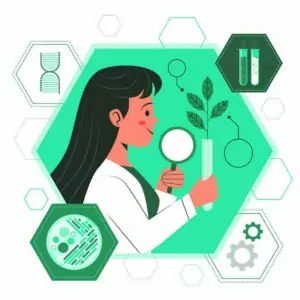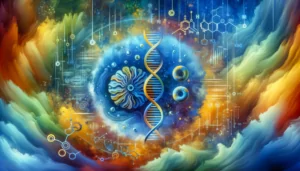In the world of biology, energy plays a fundamental role in every living organism. It is the driving force behind various biological processes, enabling organisms to perform work and undergo changes. In this article, we will delve into the concept of energy in biology, its forms, and its significance in sustaining life.

✅ AI Essay Writer ✅ AI Detector ✅ Plagchecker ✅ Paraphraser
✅ Summarizer ✅ Citation Generator
Understanding the Definition of Energy
Energy, as defined in the largest biology dictionary online, refers to the capacity for work and the ability to produce change. In the context of biology, energy is not created nor destroyed; instead, it undergoes conversion from one form to another. This concept, known as the conservation of energy, is a fundamental principle that governs energy transformations in biological systems.
The Forms of Energy in Biology
In biology, energy exists in various forms, each playing a unique role in sustaining life. Let’s explore some of the key forms of energy and their significance:
Kinetic Energy: Kinetic energy is the energy associated with motion. In biological systems, it is evident in various processes, such as muscle contraction, movement of cells, and the flow of fluids within organisms. For example, the beating of a heart and the swimming of a fish both rely on kinetic energy.
Potential Energy: Potential energy refers to stored energy that can be converted into kinetic energy. In biology, potential energy is often stored in molecules such as carbohydrates and lipids, which act as energy reservoirs for cells. When these molecules are broken down during cellular respiration, the potential energy they hold is released and converted into usable forms, such as ATP (adenosine triphosphate).
Thermal Energy: Thermal energy is the energy associated with heat. In biological systems, thermal energy is crucial for maintaining the optimal temperature required for metabolic processes to occur efficiently. Organisms have developed mechanisms to regulate their internal temperature, ensuring that biochemical reactions proceed optimally.
Gravitational Energy: Gravitational energy refers to the potential energy possessed by an object due to its position relative to a gravitational field. While gravity’s role may not be as prominent in biological systems as in other fields, it still influences various biological phenomena, such as plant growth against gravity and the movement of fluids within organisms.
Chemical Energy: Chemical energy is stored in chemical bonds and is released during chemical reactions. In biology, this form of energy is essential for cellular processes, such as the synthesis of biomolecules, cellular respiration, and photosynthesis. The breaking and formation of chemical bonds release and store energy, respectively, enabling organisms to carry out vital functions.
Electromagnetic Energy: Electromagnetic energy includes various forms of energy carried by electromagnetic waves, such as visible light, ultraviolet radiation, and infrared radiation. Photosynthetic organisms, such as plants and algae, utilize electromagnetic energy from sunlight to drive the process of photosynthesis, converting it into chemical energy.
Nuclear Energy: Nuclear energy is the energy stored within atomic nuclei. While nuclear energy is not directly involved in biological processes, it is worth noting that nuclear reactions, such as those occurring in the Sun, provide the primary source of electromagnetic energy that sustains life on Earth.
Examples of Energy in Biological Systems
To better understand the significance of energy in biology, let’s explore a few examples where energy plays a crucial role:
Cellular Respiration: Cellular respiration is a metabolic process that occurs in cells, converting the energy stored in molecules such as glucose into ATP. During cellular respiration, the chemical bonds in glucose are broken down, releasing energy that is used to generate ATP. This energy-rich molecule serves as a universal currency within cells, providing the necessary energy for various cellular activities.
Photosynthesis: Photosynthesis is the process by which green plants, algae, and some bacteria convert light energy into chemical energy. Through the capture of sunlight, photosynthetic organisms utilize the energy to synthesize glucose and other organic molecules, storing potential energy for later use. Photosynthesis is a vital process that sustains life by generating oxygen and providing a source of energy for heterotrophic organisms.
Muscle Contraction: Muscle contraction involves the conversion of chemical energy into mechanical energy. When muscle cells receive signals from the nervous system, ATP is hydrolyzed, releasing energy that powers the contraction of muscle fibers. This allows organisms to move, maintain posture, and perform essential activities.
Active Transport: Active transport is a vital process that enables cells to transport molecules against concentration gradients. It requires energy in the form of ATP to pump molecules across cell membranes, ensuring the proper balance of ions and nutrients within cells. Active transport plays a crucial role in nutrient uptake, waste removal, and maintaining cellular homeostasis.
Metabolism: Metabolism encompasses all the chemical reactions occurring within an organism to sustain life. Anabolic reactions require energy to build complex molecules, while catabolic reactions release energy by breaking down molecules. Together, these processes enable organisms to obtain and utilize energy from the environment, supporting growth, reproduction, and other vital functions.
Conclusion
Energy is an essential concept in biology, serving as the vital force that drives various biological processes. From kinetic and potential energy to thermal and chemical energy, each form plays a crucial role in sustaining life. Understanding the role of energy in biological systems helps us appreciate the intricate mechanisms that allow organisms to thrive and adapt to their environments.
FAQ
How is energy stored in biological systems?
Energy is stored in biological systems through the formation of chemical bonds in molecules such as carbohydrates and lipids. These molecules act as energy reservoirs that can be broken down to release energy when needed.
What is the role of energy in cellular respiration?
Energy plays a crucial role in cellular respiration. During this process, energy stored in molecules such as glucose is released through a series of chemical reactions. This released energy is then used to generate ATP, the primary energy currency of cells, which powers various cellular activities.
Can energy be created or destroyed in biological systems?
According to the principle of conservation of energy, energy cannot be created or destroyed in biological systems. It can only be converted from one form to another. This means that the total amount of energy in a biological system remains constant over time.
How do organisms obtain energy from their environment?
Organisms obtain energy from their environment through the consumption of organic matter or the absorption of sunlight. Heterotrophic organisms, such as animals, obtain energy by consuming other organisms or their byproducts. Autotrophic organisms, such as plants and some bacteria, capture sunlight through photosynthesis to produce their own energy-rich molecules.
How does energy flow through ecosystems?
Energy flows through ecosystems in a unidirectional manner. It enters the ecosystem as sunlight or chemical energy stored in organic matter. Producers, such as plants, capture this energy and convert it into organic compounds through photosynthesis. Consumers then obtain energy by consuming these organic compounds. Energy is transferred from one trophic level to another as organisms are consumed, with a significant amount lost as heat during each transfer.
How does energy efficiency affect ecological systems?
Energy efficiency is a crucial factor in ecological systems. Higher energy efficiency means more energy is transferred and available for consumption at each trophic level. Efficient energy transfer allows for greater biomass and productivity within an ecosystem. Inefficient energy transfer can lead to limited resources and challenges in sustaining populations.
Can energy be recycled in biological systems?
While energy cannot be recycled in the strict sense, it can be transferred and reused within biological systems. Energy released during the breakdown of organic molecules can be used to synthesize new molecules or perform work within the organism. However, the total amount of energy in the system remains constant, and energy flow is ultimately unidirectional.
How does energy relate to metabolism?
Energy is intimately related to metabolism. Metabolism refers to the sum total of all chemical reactions occurring within an organism. These reactions require energy to build complex molecules (anabolic reactions) or break down molecules to release energy (catabolic reactions). Metabolism relies on the continuous input of energy to drive the various biochemical processes necessary for an organism’s growth, reproduction, and maintenance of homeostasis.
How does energy availability impact an organism’s behavior and survival?
Energy availability greatly impacts an organism’s behavior and survival. Limited energy resources may lead to competition among organisms for access to those resources. Organisms may adjust their behavior, such as foraging or migrating, to maximize energy intake and optimize their chances of survival. Additionally, energy availability influences an organism’s ability to carry out vital activities, such as reproduction, growth, and maintenance, which ultimately affect its overall fitness and survival in its environment.
Follow us on Reddit for more insights and updates.





Comments (0)
Welcome to A*Help comments!
We’re all about debate and discussion at A*Help.
We value the diverse opinions of users, so you may find points of view that you don’t agree with. And that’s cool. However, there are certain things we’re not OK with: attempts to manipulate our data in any way, for example, or the posting of discriminative, offensive, hateful, or disparaging material.